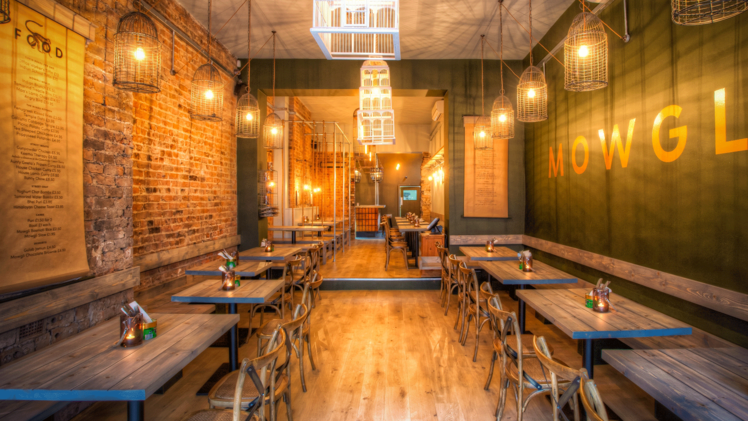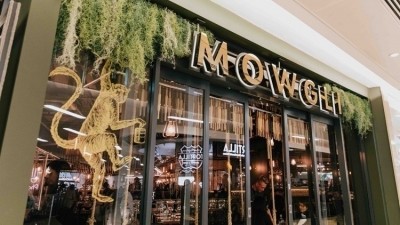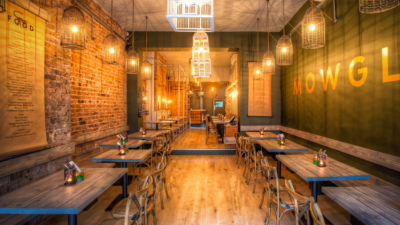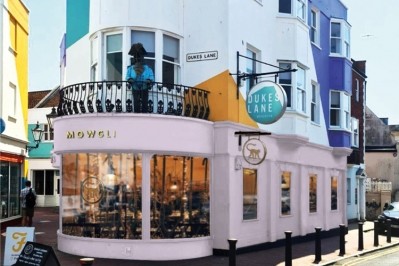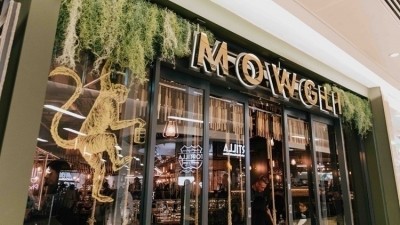Boy meets world: Indian restaurant group Mowgli is coming of age
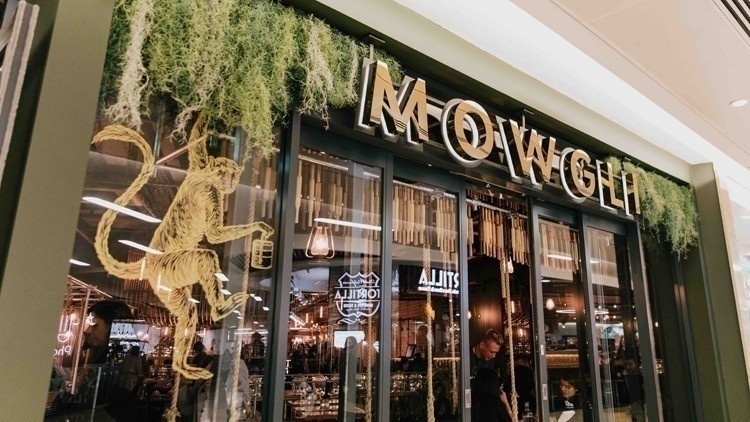
Nisha Katona is a busy person. When she’s not appearing on Great British Menu as one of the new judges alongside Ed Gamble and Tom Kerridge, she can often be found cooking on ITV’s This Morning - her latest demo being a samosa masterclass. Then there’s her new book, 30 Minute Mowgli, which is out in November (it was announced she has also joined the Government's Hospitality Sector Council following this interview). And let’s not forget The Mowgli Trust Dog Show, the outdoor festival held last month on the Wirral raising money for Children’s Hospice Claire House
Yet it is none of these that I want to discuss with Katona when we find a time in her schedule between filming and site visits to sit down and chat. Instead, it is the growth of the Indian restaurant group she founded in 2014 and which later this month opens its first site in the capital that is top of the agenda.
Mowgli has undoubtedly been one of the restaurant sector’s recent success stories since its inception seven years ago. Katona, a former barrister, left the bar to open a restaurant on Liverpool’s Bold Street serving the food Indians eat at home and on the streets, a business which has since grown into a group of 13 restaurants located primarily, but not exclusively, in the north of England.
Growth thus far has been steady but post lockdown Katona is pressing her foot down harder on the accelerator with new sites planned for Bristol, Brighton, Glasgow, Preston, Edinburgh as well as London in the coming six months or so.
Looking up during lockdown
When we meet in a cafe in Neal’s Yard Katona is in her usual ebullient mood. While Mowgli, like every other hospitality business, has been hit hard by the Coronavirus pandemic Katona’s eternal optimism remains unchecked and the company has come out of the other sides of the various lockdowns in good shape.
“I am extremely optimistic,” she says of the past 18 months. “There has not been one day of anxiety about Covid or lockdown.”
This might sound like hubris but Katona’s assuredness is based on how she has built Mowgli, combining cautious growth in areas of modest rents with sensible margins and - somewhat ironically for such an optimist - an overly pessimistic view of the what the future might hold. “We’re a relatively new business and I always built it with enough headroom,” she says. “It’s having the resources and that headroom to know you can deal with another forced closure.”
Katona clearly didn’t expect something as catastrophic as the Coronavirus when factoring this contingency into Mowgli’s early years but another event of significant magnitude was behind her reasoning. In what she describes as her formative years as a restaurateur with the opening of only her second restaurant, Wahaca was hit by the norovirus outbreak that would lead to around 200 staff and 160 diners falling ill. This, she says, at once opened her eyes to the sudden and cataclysmic challenges that a business can face and made her plan for a potential rainy day of her own.
“What psychologically happened to me there is I thought ‘there but the grace of god goes all of us’. It can happen to any of us and come out of the blue and you have to have enough cash put away so you can see a whole year of decline. I built Mowgli so cautiously.”
Such caution led to Katona announcing last year that she was scrapping her plans for a restaurant in Preston and that a site in Edinburgh was also being reconsidered (both of which are now back on) with the restaurateur saying she would only look to work with landlords who were “collaborative and circumspect” stating that the pandemic meant that Mowgli “must be pickier about what leaches out of our precious coffers”.
As a relatively new and small business, Mowgli wasn’t as hard hit by the pandemic as some of the larger groups were, not was there much soul searching or tweaking required during the downtime, of which other groups took advantage. “Mowgli is only young. As you get older as a business you can get a bit flabby and excess costs can creep in by stealth but because we’ve always had a simple build and a click and play model so there is no fat in this company anyway. We have an estate of 13, which means we didn’t gather much moss.
London calling
Katona also noted last year that London would not yet feature as part of her expansion plans, saying at the time that “taking on a swaggering, cuckoo-sized London rent will starve other fledgling [restaurants].” The capital has long been part of her plans, but it has always been a matter of timing and pre and mid pandemic it still felt like it was a risk too far for the company. “There is so much low-hanging fruit outside of London, why would I shackle myself with an enormous rent?,” she says.
Yet 12 months on, and Katona is about to open her first restaurant in the capital on Fitzrovia’s Charlotte Street. So why the change of heart? “The timing was incredible,” she says. “We found a site in Charlotte Street and got a really good deal. We have a really good landlord - he’s a foodie so it’s not some faceless corporate deal. We had a long chat and found we had a lot in common. He was really supportive and excited about the brand.”
Katona describes Charlotte Street as her “dream street” and says she knows a number of operators that are based there, including The Ninth’s Jun Tanaka. “It’s as though I’ve got a bit of a restaurant fraternity there. There is no sense of competition on that street but instead a total sense of camaraderie.”
Mowgli London will open at the end of October in a former Cote site joining recent new opening Six by Nico on Charlotte Street in a move Katona feels will help re-establish it as one of the capital’s hot foodie destinations. But while she has absolutely no misgivings about her new venture others haven’t shared her optimism.
“The London restaurant community said I was mad to come down here,” she says. “My thought was ‘is there a gap in the market that I can fill’? And there is, otherwise I wouldn’t have left the bar. If people like the food, why wouldn’t I bring it here? Why is it OK that I’m on national TV very week but told not to bring my restaurant down here?”
She equates such thinking to when she went for her my first book deal in 2015. “My agent sent my book proposal round and one of the biggest publishers said: ‘sorry we already have an Indian woman who looks like that on our books, we don’t need another one’. Mowgli is different – it is not Dishoom or Darjeeling express or Pali Hill. Each Indian household cooks differently, it’s as different as Filipino food is to Thai is to Indonesian. Every city should be able to get Dishoom’s bacon naan, Asma Khan’s prawns and my tamarind treacle fries and chat bombs.”
The people who have been the most encouraging of the move are her potential competition - the Indian restaurant fraternity - with Dishoom founders Shamil and Kavi Thakrar and Khan providing moral support. “The reason I left the bar is because I’m a curry evangelist. I’m not going to do Strictly. The more compromised authenticity there is in the food scene that’s the thing that keeps restaurants alive. These are the people who understand that.”
North/south divide
Misgivings about the move down south haven’t just come from Katona’s peers. For some, a business built in the north moving down south is regarded as a betrayal of its roots, an attitude to which Katona is all too aware. “I worried a lot about announcing I was going to move to London,” she admits. “I had a few tweets describing it as though it was tribal warfare. But the more we’re mired in that the less hope we have for the economy in this country as a whole.”
Just as she wants to bring Mowgli down south, she’s just as keen for more southern-based brands to make the move northwards. “I’m very evangelical about the north and about bringing brands to the north. We need brands to come to the north and to spread the wealth. There’s lots of people with an appetite and cash but I understand that if all you have known is London then the north can be a shrouded hinterland. Not every brand that has gone from London to the north has worked; it takes a bit of courage and understanding. You wonder if the north does kick against London brands?”
She believes that there is a real anxiety in London about the impact of Brexit on recruitment that she insists she doesn’t feel with her northern restaurants, and also over fears of yet another lockdown. Indeed, she says the only reason she can open Mowgli in London from a recruitment perspective is because there are 27 Mowgli staff members across the company who wanted to move down. “If I was having to recruit from scratch, I wouldn’t be doing it - no way. There’s a lot to be said about not being in London. You have to look at the demographic of your recruitment pool and choose wisely. There is an anxiety in London that I don’t feel as someone with a body of northern restaurants. If you want employees, get up north and bring a financial benefit to the regions.
“Talking to the community down here people are more anxious about there being another lockdown, you don’t hear that up north. If we do lockdown again there will be revenge spending the minute the doors reopen. I take a lot of comfort that our consumer appetite is enormous; we’ve been cherished more than we ever had through lockdown.”
"Why is it OK that I’m on national TV very week
but told not to bring my restaurant down here?”
When I ask whether the pandemic has made her reassess the kinds of locations she thinks Mowgli might work in, citing some restaurateurs considering a move away from the city centre to more neighbourhood locations in response to dwindling numbers of commuters and tourists, she gently chides me for such a London-centric view of the sector. “There are two different countries, London and the rest of the country. For us, if we open in Liverpool or Preston we open on people’s front doors. Manchester is a bit different because there’s Chorlton and Didsbury but for any of the other towns we are in you would always come into town to eat. By opening in city centres, we are opening in neighbourhoods.
“If we are going to develop a pipeline in London, I’d like to do something with the Shaftesbury Estate. I would love to be in Covent Garden one day. But equally there is something to be said for coming to east Dulwich – but that has always been true. If you look at the Giggling Squid model it’s always been a viable model, that’s not just about Covid. We want to grow in London but at the same time I’m mindful that we could build two restaurants outside London for every one we build in London.”
Future growth
So far, the company has very much ploughed its own furrow. While many restaurant businesses pivoted to offering meal kits or delivery - or both - to keep going Katona decided to keep her powder dry in this area. Given that Indian cuisine is already well established in the delivery arena and that her peers such as Dishoom and Aktar Islam were making such as success with their meal kits this seems a strange choice.
“I decided not to do meal kits,” she tells me in response to this reasoning. “Instead, I did an Instagram video of me cooking every day - we gained over 100,000 new followers through lockdown. People were looking for different things to keep their brands alive. It meant we didn’t have to rekindle a massive kitchen for a token amount of takeaway. It was very simple for us.
“There’s such pressure to do meal kits and delivery but I want to build her in a different way that is a bit more of a slow burn. I don’t have a passion for delivery at the moment. It’s not my dream at this stage of our brand development to have people ordering Mowgli food to eat at home. We’ve got to keep her as precious and everyone’s beloved secret as possible. The minute people start getting that to their doorstep things change. For as long as it makes sense I would rather people know that to eat Mowgli food you’ve got to come into the restaurants.
“I want Mowgli to have a cult feel to it. We are a chain and yet people don’t think we are - the whole of my tenure that is what I will kill myself to protect, that she is always seen as an independent restaurant, even if we get to 100 sites. There’s such pressure to do meal kits and delivery but I want to build her in a different way that is a bit more of a slow burn. For the pennies that we might make now with delivery what does that do to my brand and her lifespan?”
Throughout our interview Katona ascribes the ‘her’ pronoun to the business; Mowgli is almost like a family member than just a business. “It’s more demanding than any daughter I’ve ever had,” she says when I point this out. “Mowgli is a family business and a member of the family.
It is not everyone’s cup of tea – it’s all about the palate. We have regulars in every week or couple of weeks for our food. It’s an administration of a cumin-laced pharmaceutical. My own family eat in Mowgli because they need that fix, it’s what we grew up with.”
The only hiccup she’s experienced so far is with her restaurant on Manchester’s University Green which remains closed while the university students are encouraged to learn remotely away from campus. While she’s yet to take a definitive view on what to do with the venue in the short term considerations include using it as more of an events venue or using it as a training kitchen.
"I’m really sensible about the cost of my food
so naturally Mowgli was built with great
margins because I’m tight"
With 12 of its 13 restaurants operating and six in the pipeline Mowgli is approaching the 20-site mark. Expansion is no doubt picking up pace but Katona insists the brand will not get ahead of itself. “We march at a steady pace that works. And if we have to up the pace it will only be on empirical evidence that that is what we should do, not because of pressures of investors. We have seen that doesn’t work. If actually what I want is for Mowgli to go in every single airport and train station, then I might want to move a bit faster.
“The model works. There’s a lot of growth in it carrying on at this pace. It’s got a great trajectory; we’re a really lean team. The builds are easy, the food is easy, I’m in charge of it - it’s not like we’re dependent on executive chefs that are designing a menu that is constantly changing. I’m really sensible about the cost of my food so naturally Mowgli was built with great margins because I’m tight. Indian is good for a decent business model.”
Katona took on investment early on in Mowgli’s life with Karen Jones, founder of Café Rouge, on the board. It’s a relationship that works. “Our investors have been brilliant; it has been such a pleasure to work with them. We’re all of one mind. It was the most traumatic thing in the world to sell some shares and bring in an external company.
“Karen is my chair; we see things in the same way. What that’s taught me is that the formula works beautifully so far and I’m in no rush to replace them with somebody with a different world view. And I am staying in for now, people would want me to stay in for the next cycle at least. It’s finding that right new investor when the time comes. And the time will come.”
For the immediate future growth is likely to stay as it is with Katona keen to explore more parts of the country. Needless to say, she is optimistic of what the future holds for Mowgli.
“We want to grow in London but at the same time I’m mindful that for every one restaurant of the prices in London we can build two outside of London. Mowgli suits some people – and enough people to be able to grow at the rate of four or five a year. One day it might not but there’s no waning yet.”
